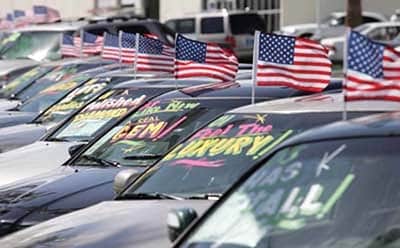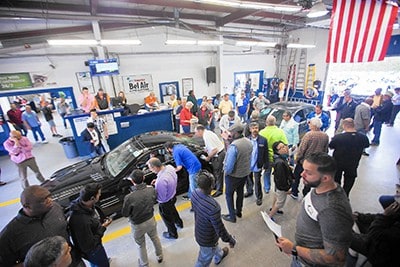Where do Used Car Dealers Get Their Cars From?
When you go online to buy a used car you’ll be presented with an almost unlimited supply to choose from, but have you ever stopped to wonder where used car dealers get their cars from?
Used car dealers get their inventory from a number of sources, which include trade-ins, auctions, rental companies, fleets, finance companies, private sellers, ex-demonstrators, and pre-registered new vehicles.
It’s not a cliché to say that every used vehicle is unique. While buyers can shop one dealer against another on a new car because they could both supply an identical model, no two used cars are exactly the same. They can differ on obvious things like color and specification, but they also differ on mileage, condition, how many owners they’ve had, what types of previous owners they’ve had, and other things.
It’s also a fact that not all used cars and other used vehicles are suitable for all used car dealers. Some dealers will specialize in certain types of vehicles such as trucks, SUVs, sports cars, diesels, or other categories.
Some specialize in cheaper, more affordable models, others will go with expensive high-end models, some will only sell models of a certain age and mileage, and others may only sell vehicles from specific manufacturers.
No matter what type of dealer it is, they have to get their used car inventory from somewhere, and it has to be from a source that’s cheap enough for them to be able to re-sell at a profit. Let’s take a look at the different sources where used car dealers get their cars.
Trade-ins
The most obvious source of used car inventory is the trade-in. These are vehicles that customers sell to dealers when they are buying another vehicle from the dealer. Selling your old car to the dealer you’re buying a brand new or another used one from is by far the easiest and most convenient way of getting rid of it and getting what it’s worth to put towards your next vehicle.
This is often the best source of the most profitable used vehicle inventory for dealers. The seller is the closest thing they are going to get to a captive audience, and the dealer gets to inspect and test drive the vehicle in a way they can’t with vehicles from some other sources.
If it’s a vehicle that’s particularly attractive to the dealer they can offer a good price for it and sweeten the deal even more with discounts and offers on the vehicle the customer is looking to buy.
I know from personal experience that there are times when a dealer will go out of their way to do a deal on a new car to get a particularly desirable trade-in. Used cars are generally far more profitable than new cars, so it could even be worthwhile to break even or lose money on the sale of a new vehicle to get a trade-in that could offer an opportunity for a big profit later on.
Auctions
Auctions are another major source of used car inventory, but just like used vehicles, not all auctions are the same. There are open auctions that anyone can go to, and these sell vehicles of all types, ages, mileages, prices and conditions.
There are some that sell vehicles from specific sources such as government auctions, which are where vehicles used by state and federal authorities and agencies are disposed of. However, not all of these more specialized auctions are open to everyone. Auctions on eBay Motors are somewhere car dealers can look for inventory, but you can beat them to it as anyone can buy from eBay.
Closed auctions are another type of auction dealers go to in order to obtain used vehicle inventory. Buyers have to register to be allowed to attend and bid at these auctions and to get registered buyers will have to present their trade credentials.
This type of auction is where new, lower mileage, better condition vehicles are generally sold. They are a good source of quality used vehicle inventory for dealers, but they’re generally pretty low risk, the competition among bidders is high, and potential profit margins can be relatively low.
If you’re interested in buying from an auction yourself, don’t miss this article that tells you all about buying from an auction. And if you fancy buying a used vehicle for seriously low money yourself from an auction, check out this link to where the government and police departments dispose of their vehicles for silly low money.
Rental companies
It’s unlikely that a single dealer will be able to buy ex-rental vehicles direct from a rental company, but they do supply larger dealer groups directly and they sometimes sell to dealers through manufacturers.
I’ve bought many ex-rental vehicles from the manufacturer, and sometimes they are even put up for sale on a manufacturer’s website with a retail section so you can show them to retail customers and sell them directly from the website without having to purchase them first.
A lot of the time, rental companies will dispose of vehicles they no longer want to rent out through closed auctions. These vehicles are relatively new, they can be relatively low mileage, but they can also be a bit of a risk. If you’ve ever heard the term “drive it like you stole it,” that should give you an idea of what the risk is with buying an ex-rental. People who rent vehicles rarely treat them well, so these are not exactly risk-free purchases.
Unfortunately, unless the dealer is going to disclose it to you if you ask, you’re unlikely to be able to know if a used vehicle on a lot has come from a rental company.
Fleets
Fleets come in all shapes and sizes, and there is some overlap here with rental companies. Rental companies tend to be the largest fleets, which is why I gave them their own section. Fleets can be anything from a handful of vehicles used by a small company, but they can also be collections of hundreds or even thousands of vehicles run by massive corporations and other organizations.
Small dealers can have deals with local companies to supply them with vehicles and also to buy them back as used vehicles when they want to change them. This type of arrangement can happen on a larger scale too, with bigger dealer groups and larger fleets.
Some fleets will use auctions to dispose of their old vehicles, and some fleets are so big they can fill an entire auction exclusively with their own vehicles.
Ex-fleet vehicles can be a good buy because they will have been maintained with no expense spared, and they are often prepared for sale as if they were going straight onto a dealer lot before the dealer buys them.
Even if they have had a thorough once-over before being sold to a dealer, the dealer will still put them through their own pre-sale preparation regime before putting them up for sale. They might have a lot of miles on them, but ex-fleet cars can still be a very good buy.
Finance companies
Once again, there can be a bit of a gray area or an overlap between ex-fleet vehicles and those coming from finance companies. After all, if a finance company has ten thousand cars coming off lease in a month, isn’t that just a massive fleet? Well actually, there is a subtle difference here. Even if you see these as fleet cars, they haven’t necessarily been looked after in the same way as genuine fleet vehicles.
Although some of the vehicles coming from finance companies will have come from company fleets, there will also be a significant amount coming from retail buyers. And when they finally end up on a lot for sale you’re not going to know which they are, even if the dealer tells you the vehicle you’re interested in is an ex-lease car.
A lot of the time, ex-finance company vehicles will be sold through closed auctions, but there is another way a lot of these come to market these days. The other way is through used car supermarkets, and they get these vehicles directly from the finance company on a sale or return basis.
The way it works is a finance company will have an arrangement with a group of car supermarkets, which are those massive auto malls with hundreds, if not thousands, of late-model used vehicles for sale. The finance company sends them straight to the car supermarket when they come in from the user. They have not been prepared by the finance company before they are shipped to the retailer.
The retailer doesn’t buy these vehicles from the finance company that wants to dispose of them. They take them for a period of around 90 days on a sale or return basis, and the car supermarket puts them through a pre-sale inspection and preparation regime, and services them if necessary before they go on sale.
The expense for this is down to the retailer, and if they don’t sell in the 90-day period they go back to the finance company fully prepared for sale.
How much the vehicle will cost the car supermarket to buy from the finance company will have been set beforehand, so the retailer knows how much the car will cost them if they do manage to sell it. They also have those preparation costs to take into account, so I can assure you the profit margins they are working on are relatively small.
Like large grocery stores, the business model for car supermarkets is to sell an awful lot of vehicles at relatively low margins.
If the car supermarket hasn’t managed to sell a vehicle in the agreed period, the finance company will then send it to an auction. That will probably be a specialist closed auction where smaller dealer groups and independent dealers will snap them up.
Private sellers
Not everyone who sells their old vehicle to a dealer is trading it in. Some people will sell directly to a dealer without buying another vehicle from them, and sometimes they end up doing this without even knowing.
Do you know all those private used cars for sale on Gumtree, eBay, cars.com, Craigslist, Autotrader, and other places? Private buyers are not the only people scouring those ads.
Lots of dealers, dealer groups, and independent traders scour them too, looking for used vehicle inventory. They may identify themselves as dealers or traders when they find a suitable vehicle and enquire about it, but sometimes they might not.
However, if you’re advertising your vehicle for $17,000 and someone gets in touch offering you $10,000, there’s every chance they are a trader or a dealer looking for the stock to resell.
When I say a trader, what I mean is someone who simply buys used vehicles from wherever they can find them and sells them to dealers for a profit. They probably don’t have a retail site and they will mostly sell to existing contacts they’ve built up over time, but they may also be looking to buy cheap from someone and “flip” it quickly by selling it themselves online.
Ex-demonstrators
Ex-demonstrators are new vehicles the dealership has registered to the business itself to use for service loan purposes, for staff and family members to drive, and for customers who are thinking of buying a brand new one to test drive. These will be sold when they are three months or so old and they won’t have too many miles on the odometer. If you want to find out more about ex-demo cars and if buying one is right for you, make sure you check out this blog about ex-demonstrators.
Pre-registered vehicles
Not all dealers will advertise pre-registered as pre-registered vehicles. A lot of the time they will advertise them as demonstrators. These are new cars that have been registered to the dealership, just like a demo, but they are not used by the dealership.
These vehicles have been registered to hit a monthly, quarterly or annual sales target because they qualify for targets and bonuses just as if they had been sold and registered to retail customers.
Unlike demos, these vehicles owe the dealership exactly the same as a brand new example. There has been no de-fleet bonus from the manufacturer, so, as they cannot be sold as brand new, they have to be priced much lower than a brand new model where the customer would be the first owner.
These vehicles can pose a bit of a problem for dealers. Once they are registered they start depreciating just like any other vehicle, so the longer they stay on the lot, the more the dealership is liable to lose when they are sold.
You can also tell a pre-registered vehicle from an ex-demo because a pre-reg will have no more than delivery miles on it and it can be less than three months old. Most demonstrators cannot be sold by dealers until they are at least three months old due to terms in the franchise agreements.



